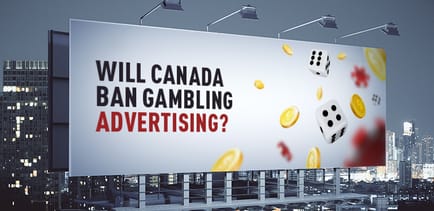
A discussion has been launched about the impact of online gambling ads on society.
The question of the impact of online gambling ads and their potential ban has sparked debate across the country. Opinions are divided into two camps. The first camp advocates banning gambling ads because of the impact they have on individuals, while the other camp believes that banning them takes away freedom of expression and that messages related to responsible gambling are necessary.
Canadian Online Gambling Ads
The Canadian gambling advertising industry operates under a regulatory framework that aims to strike a balance between advertising gambling activities and responsible gambling. Considering the growing popularity of online gambling platforms, it seems that the widespread implementation of digital advertisements has a great impact on the development of the industry. One of the reasons for this is that players attach great importance to the ads they see for specific operators.
In Canada, each province has its own jurisdiction and respective gambling regulatory body, which means that the regulations regarding gambling advertisements are also different. For example, the British Columbia Lottery Corporation (BCLC) deals with regulation in British Columbia, while the Alcohol and Gaming Commission of Ontario (AGCO) is the institution responsible for this in Ontario. Each of these bodies imposes its own rules to ensure that advertisements are in compliance with the jurisdiction and that they are socially responsible.
Some of the gambling advertising campaigns in Canada are focused on spreading the message of playing within your limits. Such is, for example, the Ontario Lottery and Gaming Corporation's (OLG) campaign - "Know Your Limit, Play Within It", whose emphasis is placed on promoting responsible gambling behaviour and emphasizes the importance of self-control and moderation.
Trending in Canada, advertisements not only for gambling but in general have a great influence on shaping public opinion, shaping perceptions, and determining relevant behaviour. With this in mind, gambling ads can excite people with the variety they show and encourage them to play. Therefore, the first camp is of the opinion that advertisements can become the cause of problem gambling behaviour with some even going so far as to claim that advertisements are aimed at vulnerable individuals.
In order to address these concerns, Canadian regulations are becoming increasingly restrictive regarding advertising content and where it can be placed. One of the mandatory requirements is that ads include responsible gambling messages and promote self-exclusion programs.
The Gambling Ads: Good or Bad?
From the casino's point of view, gambling ads are a major means of promoting their offerings and attracting new players. Special visual effects, sharing promotions, and storytelling create brand awareness that can eventually generate revenue. For them, ads are a platform to showcase collections containing a variety of games, as well as to highlight the advantages of the casino. Advertisements, however, often emphasize the possibility of big winnings in order to arouse interest in gambling among people who have not practiced it before.
From the players' point of view, ads are a source of information about new games, promotional offers, and events. They can create excitement in people which becomes an encouragement to join a gambling platform and start playing. However, this is not the only effect that advertisements can provoke. They can serve as a reminder to practice responsible gambling, as many of the ads contain similar messages about setting limits, mutual aid programs, and appeals for self-control.
Nevertheless, many argue that such advertisements can normalize gambling and make it seem glamorous, which in turn leads to problem gambling behaviour. In addition, the camp that supports the ads claims that they are aimed at vulnerable people who are experiencing financial difficulties, can encourage them to practice gambling and make their situation worse. They add that ads can lead to impulsive, rash gambling decisions.

The Possible Ban
So, will gambling ads be banned in Canada? The topic is still up for debate, but prominent figures have already backed the potential ban. Children's entertainer Raffi Cavoukian, Olympic medalist Clara Hughes, and NHL hockey dad Karl Subban have come out in support of the campaign to ban gambling ads on the territory of the second largest country in the world. Their participation raises awareness of the concerns surrounding advertising and influences the growing number of advocates for stricter regulations to protect vulnerable individuals. In addition, the Canadian Mental Health Association (CMHA) also expresses its concerns regarding gambling advertisements and the way they are perceived.
Camille Quenneville, CMHA Ontario CEO, believes that online gambling ads have a negative impact not only on vulnerable people, but also on youth. According to studies, gambling advertisements normalize gambling and contribute to its spread among young people. Data from Statistics Canada surveys indicate that more than 300,000 Canadians are at moderate or severe risk of developing a gambling problem.
Concerns about gambling ads have led to the formation of both camps based on their proposed solutions to curb the problem. The first camp is pushing for a complete ban on gambling ads, while people in the second camp like Jeffrey Derevensky from the International Center for Youth Gambling and High-Risk Behaviours are pushing for strict regulations instead.
The resulting debate shows the clear need to balance the promotion of responsible gambling practices and the protection of vulnerable individuals. Derevensky's proposal for solving the problem is to reduce the number of advertisements, to make them less attractive, make them not glamorise gambling, and to be shown only in the late hours of the day in order to limit the share of young people who could potentially view them.
Canadian law faces a complex case in terms of the need to strike a balance between protecting vulnerable individuals and allowing advertising related to responsible gambling. For the time being, it seems that the positions of the second camp for imposing stricter regulations instead of banning gambling ads are gaining ground. However, the focus should be on raising awareness of the potential risks of gambling rather than advertising with the sole aim of attracting new users.















Alistair Edwards
Alistair is a journalism graduate from London in the U.K and also our junior researcher and copywriter. When he’s not working in the office on all sorts of projects, Alistair loves to play online poker and one day (when he’s a millionaire!) he hopes to publish a book about poker tips and how to profit from playing online poker.